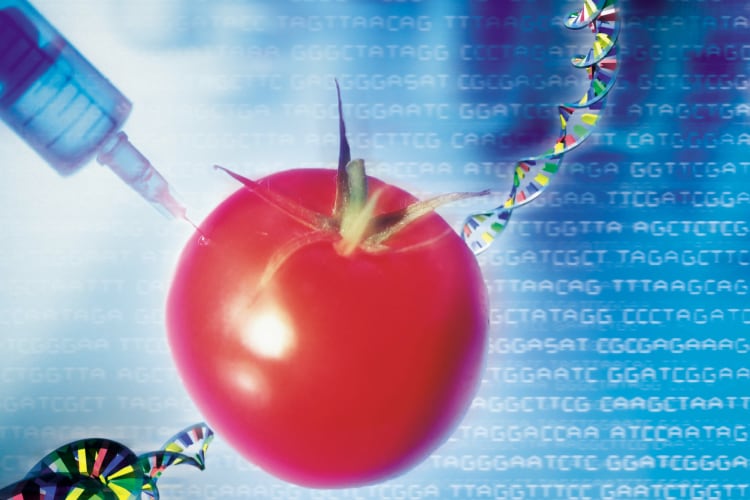When the possibility of genetically modified food was first mooted in the 1990s, European public opinion was firmly opposed. Tabloid splashes linked GMOs to everything from meningitis to a corporate plot to seize control of food supply.
Across Europe, media coverage of this much-misunderstood science reached a crescendo at a time when concerns over food safety and perceived ‘unnatural’ meddling in food production was at fever pitch due to the BSE crisis. Even the-then Prince Charles intervened, writing to the Prime Minister of the time, Tony Blair, to criticise the development of genetically modified foods. In civil society, meanwhile, the likes of Greenpeace, Five Year Freeze and the Soil Association were spearheading a campaign suggesting proponents of GMOs were attempting to put ‘profit before people’ and risking the health of humans and the natural world. By 1999, the discussion was so frenzied that UK Cabinet Minister Jack Cunningham accused the media of ‘mass hysteria’ over the subject.
The public backlash in Europe has meant GMO food is still viewed with a degree of scepticism in the region. However, there is evidence that this sentiment is shifting. According to Eurobarometer research, EU citizens concerned about the presence of GMOs in the environment decreased from 30% in 2002 to 19% in 2011, while the level of concern about the use of GM ingredients in food or drinks has dropped from 63% in 2005 to 27% in 2019.
More recent analysis from the pro-GMO Alliance for Science (AfS) dug down into traditional and social media discussions of biotechnology. The peer-reviewed study identified a ‘significant drop’ in the prominence of the GMO discussions between 2018 and 2020. This, the researchers believe, could point to a less polarized debate on the subject.
"This seems like cautious good news for science," reflected study author Mark Lynas, research lead at the AfS. "Given the worldwide scientific consensus on the safety and utility of genetic modification, this suggests that misinformation about GMOs is losing its ability to persuade, even on social media."

‘We are moving toward a more favourable conversation on GMOs’
The AfS study, funded by the Bill and Melinda Gates Foundation and compiled in partnership with media monitoring company Cision, looked at the number and tone of over 100,000 online and print articles published in English in top-ranked media between 2018 and 2020 as well as 1.7 million social media interactions. Leveraging over three years of continuous tracking and analysis, it found that the overall tone of the GMO conversation has been surprisingly positive, averaging 73% either neutral or favourable comments. There was a divide between perceptions in traditional and social media, which were 78% and 62% neutral or favourable respectively.
While the volume of traditional media coverage increased during the study period, social media discussion of the issue dropped more than 80% between January 2018 and December 2020, the period covered by the study. Since fewer people are posting about GMOs it suggests the issue is becoming less salient, the authors concluded.
"Our data suggest that across all media environments, we seem to be moving toward a more favourable conversation on GMOs," Lynas commented. “This is consistent with other measures of the ‘debate’ that appears to be waning in light of more urgent, real-world challenges, like addressing nutritional security in a changing climate.”
Analysts at Barclays Capital believe this change in tone could have profound consequences for the development of synthetic biology as a disruptor in consumer markets.
What do the market analysts mean by synbio? It starts with the science. The DNA of a cell tells it what to do – commands like what proteins and enzymes to make. If scientists are able to programme DNA in the same way as software engineers can programme computers, they can tell plant, animal, or microbe cells to produce target molecules. This can be seen in action in areas like precision fermentation, which can use enzymes to produce – for instance – animal-free dairy proteins.
“The key benefits of synbio are that it is more sustainable than traditional manufacturing processes, can provide access to hard-to-source ingredients as they are found in nature, and can help create ingredients or products that are superior to what is currently on the market. However, because synthetic biology is predicated on genetic engineering, products may be (though are not by definition) considered genetically modified organisms,” according to Barclays.
Defining GMOs: Does it matter?
At this point it is perhaps worth pausing to consider the difference between GE and GMO techniques. Gene editing tools are used to generate changes to the native genetic material. Unlike GMOs, which introduce novel configurations of genetic materials typically derived from other organisms, gene editing methods modify existing genetic material. But, at the end of the day, Barclays doesn’t think shoppers will make this distinction.

“We believe the nuances as to what qualifies as 'GMO' or 'bio-engineered', or 'gene-edited' are less scrutinised at this stage. With 'GMO' being the more longstanding term, if an ingredient/product uses genetic engineering in any way, shape or form, we believe a consumer could interpret that as being related to GMOs and thus assign any preconceived notions around GMOs to that ingredient or product. The conflating of synbio with GMOs might not matter if there wasn’t a long-standing stigma associated with GMOs. But, the reality is that even though synbio is a way that genetic engineering can be used to benefit consumers and the environment, in the consumer arena there is the risk that the narrative could well dovetail with the longstanding perception that GMOs are not of benefit to consumers.”
Nevertheless, Barclays does detects a change in the GMO narrative. The investment bank recently carried out a survey of UK consumers to assess the likelihood of them buying genetically engineered products. The results of the survey pointed to two key takeaways: age makes a difference and ‘sustainability’ is a top priority that ‘could sway decisions’.
“The legacy GMO narrative appears to be fading; younger UK adults are more open to the concept of genetic engineering in consumer products,” the analysts concluded. “The majority of UK adults would buy a product that has a GE-ingredient, with the primary driver being ‘sustainability’ - a trend that is amplified as age veers younger and income moves higher.”
Messages such as ‘sustainable’ and ‘animal-free’ resonate more with younger and more affluent shoppers and outweigh the ‘GMO-free’ claim for many, it was found.
Will GMO regulation soften?
Winning consumer hearts and minds is just one part of the battle to unleash the disruptive potential of these emerging technologies in Europe. Regulation is an entirely different question. Reflecting the concerns of their citizens, the EU and UK have historically taken a cautious approach to GMO regulation - into which genetic engineering has also been bundled.
In the wake of Brexit, there has been some adjustment to this stance in the UK. The Department of Environment, Food and Rural Affairs is dropping the risk assessment requirement on gene-edited crop trials and has said, in the future, it will move to change the definition of GMOs to exclude gene-edited organisms. Additionally, the Genetic Technology (Precision Breeding) Bill 2022-23 has been introduced to Parliament.
The argument is also being put forward by the European scientific community that a relaxation in regulatory approach is needed within the bloc.
Mihael Cristin Ichim, of the Research Centre for Biological Sciences at National Institute of Research and Development for Biological Sciences in Romania, insists the softening attitude of European citizens to such technologies necessitates a new policy direction from Brussels.
“In contradiction with the general belief that the Europeans are against GMOs, the concerns expressed by the EU citizens toward the use of GMOs in farming and food have significantly decreased in the past 20 years,” he suggested. “The more favourable attitude of the EU citizens toward GMOs should ease the way and encourage a positive change of the legal framework that regulates the GM crops’ testing and commercial cultivation in the EU.”
While genetic modification and editing technology has had a bumpy ride in the region, it would certainly seem that European proponents aren't yet ready to tap out and admit defeat in the court of public opinion. And, indeed, there are now some signals that the tide could be starting to turn.
Sources
‘The state of the ‘GMO’ debate - toward an increasingly favorable and less polarized media conversation on ag-biotech?’
GM Crops & Food
DOI: 10.1080/21645698.2022.2051243
Authors: Sarah Evanegaa, Joan Conrow, Jordan Adams & Mark Lynas
‘The more favorable attitude of the citizens toward GMOs supports a new regulatory framework in the European Union’
GM Crops & Food
DOI: 10.1080/21645698.2020.1795525
Author: Mihael Cristin Ichim



